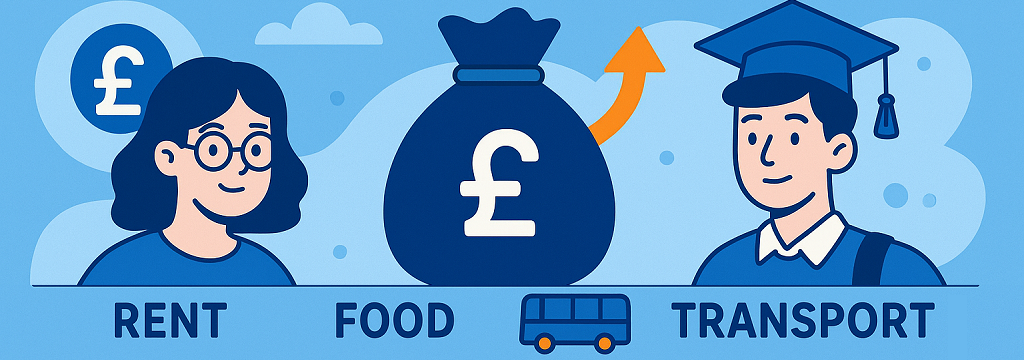
Both domestic and international students must be aware of the living costs in UK to succeed academically. It is a well-liked option for pursuing a master’s or a PhD degree in UK because of its excellent universities and fascinating cultural events. However, various expenses could affect your time as a student. Because of the high living expenses in UK, every aspect of daily life, including housing, requires careful planning. Students must contend with complex costs as inflation stabilizes but continues to impact prices. This article examines the student living costs in UK, breaking down major expenses like rent, food, and transportation. We will also provide you with helpful guidance on budget management.
Factors Affecting Student Living Costs in UK
Regional Variations
Depending on where you study, living costs in UK can vary greatly. For example, London is the most expensive city in England, with monthly expenses surpassing £2,000. On the other hand, cities like Sunderland, Hull, and Cardiff have more reasonably priced options (£1,000 – £1,200). Diverse local economies, transportation, and rental variations cause these regional differences in the cost of living in England, Wales, and Scotland. Students must weigh their academic objectives against their financial situation when choosing a university. Edinburgh and Oxford have middle-range living costs in UK (£1,500 – £1,700). You may use Finder.com’s calculator to compare your intended cities. Here is a list of five different cities in UK with monthly cost ranges in accommodation:
1. London, England (£900 – £2,200): London is the most expensive city in the UK, with student rents varying widely by area. Central zones such as Kensington, Westminster, and Camden are extremely costly, while outer areas like Stratford, Wembley, or Lewisham offer more budget-friendly options. London hosts world-leading universities, including UCL, Imperial College London, and LSE, and provides unparalleled access to industries such as finance, tech, creative arts, and biomedical sciences.
2. Edinburgh, Scotland (£700 – £1,500): Edinburgh’s accommodation costs are higher than the UK average, largely due to high demand from students and limited city-centre housing. Areas such as Leith and Gorgie offer more reasonable prices than the Old Town or New Town. Edinburgh is home to prestigious institutions like the University of Edinburgh and Heriot-Watt University and offers strong opportunities in data science, finance, renewable energy, and public policy.
3. Manchester, England (£600 – £1,200): Manchester is known for offering relatively affordable student housing compared to London. Popular student areas like Fallowfield and Rusholme offer competitive rents and easy transport links. The city has a vibrant academic atmosphere, driven by the University of Manchester and Manchester Metropolitan University, and is a growing hub for tech, media, and advanced manufacturing.
4. Sunderland, England (£350 – £750): Sunderland is one of the most affordable student cities in the UK. Accommodation costs are significantly lower than those in major metropolitan areas, especially in neighborhoods close to the University of Sunderland. The city has a quieter lifestyle, excellent coastal surroundings, and growing sectors such as automotive manufacturing, digital technology, and healthcare.
5. Hull, England (£350 – £750): Hull provides very budget-friendly student housing, making it attractive to those seeking low living costs. Popular areas include Newland and Cottingham Road, which offer easy access to the University of Hull. Living expenses in Hull are generally well below the national average, and the city has ongoing development in logistics, renewable energy, maritime industries, and healthcare services.
Inflation and Economic Trends
Although inflation in the UK economy decreased from 11.1% in October 2023 to 3.5% in April 2025, prices remain higher than before 2023. This impacts living costs in UK, especially in necessities such as food and utilities. When creating their budgets, students need to factor in these incremental increases. Despite ongoing efforts to revive the economy, costs remain unaffordable. This trend is most noticeable in the cost of living in England, particularly in the south.

Lifestyle Choices and Their Impact
Your habits and lifestyle greatly influence the living costs in UK. Frequent dining out or opting for upscale lodging can increase your costs. On the other hand, sharing housing and cooking at home can help keep expenses under control. It all comes down to striking a balance that works for you. For instance, an outgoing student might spend £150 a month, whereas a frugal peer might limit this to £50. These decisions determine living expenses in UK, so self-awareness is essential. Significant savings can be achieved with minor changes. You have more control than you can realize.
Breakdown of Key Student Living Expenses in UK
Consider Fatima, studying a master’s degree in UK at the University of Manchester in 2025. Her monthly living expenses in Manchester come to £1,050, which includes £500 for a shared apartment, £200 for groceries, £50 for a bus pass, £100 for utilities and internet, and £200 for books and socializing. She adds £300 by working part-time. It is a difficult but manageable balance. Fatima’s tale reflects the economic yet satisfying lives of many students. The living costs in UK stretch her budget, but she manages to make ends meet through cooking and discounts. Since your breakdown is specific to you, it undoubtedly varies.
Student Accommodation Cost UK
Housing will account for most students’ living expenses in UK in 2026. Private rentals in London can cost up to £1,200 per month, while university halls typically cost between £800 and £1,000. Halls outside London cost between £400 and £600, with private options costing slightly more. Amenities and location influence these numbers. A common choice for second-year students is to share an apartment with their peers, which can reduce expenses by 20–30%. Although commuting may cause additional costs, living in rural England offers even lower rents. You may use Finder.com’s calculator to find the answer to the “What is the typical cost of student accommodation in major UK cities?” question
Food and Groceries Expenses in UK
Food is another major component of student living cost in UK. In 2026, students can expect to spend between £200 and £300 per month on groceries, depending on their dietary needs. Those who eat out frequently may see costs rise to around £400, while shopping at budget-friendly stores like Aldi or Lidl can bring expenses down to as low as £150. In this area, cooking skills make a real difference, so bulk buying and meal planning can significantly ease the financial burden. Managing food costs requires consistent effort, but the rewards increase over time. For international students, sourcing specific ingredients for traditional dishes may slightly increase their food expenses.

Utility Bills and Internet Costs UK
In the UK, gas, electricity, and water utilities add between £50 and £100 to monthly living expenses and are frequently provided in dorms for students. With energy prices still reflecting 2020’s increases, private renters should budget between £120 and £150. The internet, which is essential for studying, costs between £20 and £40 per month. These are necessities that cannot be compromised. The burden is lessened by splitting bills with roommates or bundling services. Winter heating costs may rise in colder regions, increasing the cost of living in England.
Transport Expenses for Students in UK
The living costs in UK are influenced by transportation, which varies by city and lifestyle. Buses in smaller regions typically charge between £40 and £60 per month. One benefit of being close to campus is that walking or cycling reduces this to almost nothing. There is always a cost to mobility. Students in rural areas may occasionally need to take train trips, which would cost an additional £20 to £50 per month. These choices are reflected in living costs in UK, where public transportation is essential for many. You can control the cost by carefully planning your routes.
Last Words on Living Costs in UK
As a student, you face many challenges when managing living costs in UK. Whether it is the low cost of living in Newcastle or the high cost of rent in London, your location sets the tone. When you include transportation, food, and personal preferences, the living costs in UK become a mystery. If you have a plan, you can handle it. Understanding your spending limits will ensure you take full advantage of the UK’s amazing experiences. Be prepared for life’s unexpected turns. To keep living costs in UK under control, take advantage of discounts, jobs, loans, assistantships, studentships, and scholarships.




0 Comment